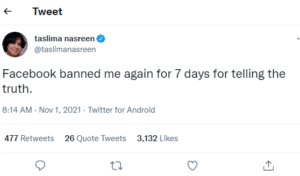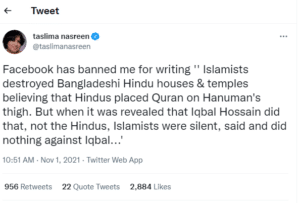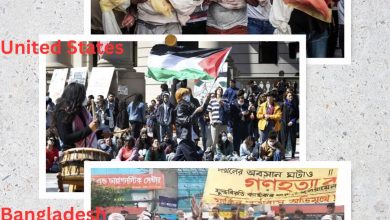Facebook Bans Taslima Nasreen’s Account once again for 7 Days

Facebook has banned the account of renowned Bangladeshi author Taslima Nasreen for seven days due to her alleged “hate speech” post. Nasreen, who always hit the headlines due to her controversial and bold statements, took to the microblogging site and said that her account has been suspended for seven days for “telling the truth”.
Taking to Twitter, the author said: “Facebook banned me again for 7 days for telling the truth.

On March 16 this year, Nasreen had alleged that Facebook has barred her for using the platform for 24 hours.
“#Facebook banned me for 24 hrs. My crime was I liked the decision of Aarong, a Bangladeshi handicrafts store, for not hiring a Jihadi who refused to follow the rules of Aarong, to shave off his beard to work as a salesman. Islamists have been protesting against Aarong,” she tweeted.

While on March 17, she claimed that the Bangladeshi governments banned her books.
“Governments ban my books, jihadists burn my books and threat booksellers not to sell my books. I’ve got only one platform to express my views in Bengali, that is #fb. But whenever I use my freedom to write on fb freely for my readers, FB bans me. No free-speech for freethinkers,” she said further in another tweet.
Earlier in 2015, the author’s Facebook account has allegedly been disabled by the social media company.
According to Facebook’s norms, an account will be banned if anybody breaches its “hate speech” policy.
“We define hate speech as a direct attack against people – rather than concepts or institutions – on the basis of what we call protected characteristics: race, ethnicity, national origin, disability, religious affiliation, caste, sexual orientation, sex, gender identity and serious disease. We define attacks as violent or dehumanising speech, harmful stereotypes, statements of inferiority, expressions of contempt, disgust or dismissal, cursing and calls for exclusion or segregation,” the Facebook policy said.
“We also prohibit the use of harmful stereotypes, which we define as dehumanising comparisons that have historically been used to attack, intimidate or exclude specific groups, and that are often linked with offline violence,” it added.
Nasreen left Bangladesh in 1994 in the wake of death threat by fundamentalist outfits for her alleged anti-Islamic views. Since then she has been living in exile.





